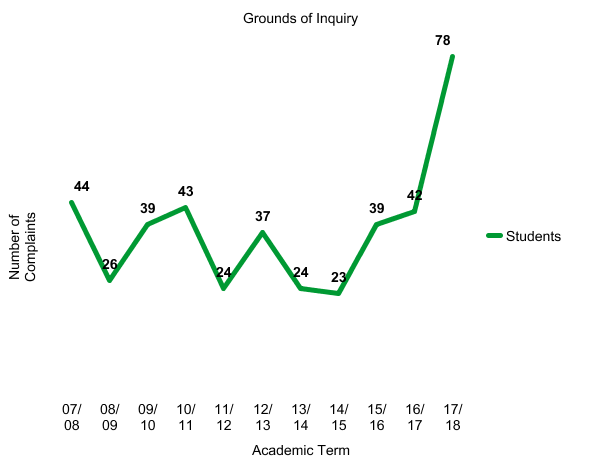McGill announced that Sinead Hunt has been appointed to the position of Senior Equity and Inclusion Advisor (SEIA) in an email to the student body on Sept. 9. The SEIA acts as a first contact for students attempting to report instances of harassment or discrimination on campus. The number of complaints increased in recent years; according to the Annual Report on Harassment, Sexual Harassment and Discrimination Prohibited by Law, released on Sept. 12, there were 78 complaints were filed in the 2017-18 academic year, significantly surpassing the historical average of 33 complaints per year over the previous five years. Of the 78 complaints filed during the 2017-2018 academic year, 26 were filed on the grounds of harassment, 11 on sexual harassment, 12 on discrimination, and 12 were filed as mixed. Nine of these cases proceeded to investigation and formal resolution, while the rest were withdrawn, did not advance beyond initial inquiry, or were resolved informally.
Last year’s report recommended increasing the number of assessors from 10 to 12 and increasing the amount of training they receive, as well as outlining a specific role for the SEIA within the Policy.
“The number of Assessors will be elevated to 12 in 2017 in view of an increase in the number and complexity of the complaints noted in recent years,” the report reads. “During 2017-2018, Assessors will attend training sessions on: the mental health impacts of harassment, best practices in investigation of complaints, recent legal developments related to discrimination and of reasonable accommodations, the meaning and impact of unconscious bias, and basic mediation skills and principles.”
A Yale Law School graduate, Hunt has worked to advance human rights causes in Sub-Saharan Africa and advocated on behalf of children with disabilities in California. As well as acting as a contact for students, her role is to oversee the implementation of McGill’s Policy on Harassment, Sexual Harassment, and Discrimination Prohibited by Law.
The policy, which was initially ratified by the McGill Senate in Dec. 2005 and came into effect Apr. 2006, aims to reduce harassment by ensuring that the university’s policies are proactive in creating an equitable environment. It also outlines procedures for addressing discrimination when it occurs. As part of the latter goal, the SEIA position was created to assist students in reporting discriminatory behaviour and oversee responses. The SEIA works with twelve assessors, who are McGill staff members appointed by the Senate to investigate and mediate complaints.
“In my role, I receive and respond to any questions relating to the Policy,” Hunt wrote in an email to The McGill Tribune. “Individuals can contact me by phone or email to discuss, in a confidential manner, any questions or concerns that they may have relating to subject matter covered by the Policy. I also conduct intake where an individual wishes to proceed with a complaint under the Policy, which may proceed by informal resolution, i.e., mediation, or through a formal investigation, which is conducted by an assessor.”
In the past year, student frustration with the McGill administration for failing to adequately address allegations of sexual misconduct, particularly with regards to teacher-student relationships, culminated in an open letter addressed to the administration and a student walkout last April. Following this, to address issues relating to harassment and inclusion more generally, McGill’s Task Force on Respect and Inclusion in Campus Life released a report in Apr. 2018 outlining recommendations to better promote respect on campus.
The report outlines how the policies in place can be improved, while acknowledging that policies are not sufficient to foster tangible change in the campus culture.
“While cognizant of current discussions about sexual violence on our campuses, we note that significant efforts have been mobilized in the past few years to create and implement policies, services, workshops and campaigns on consent and sexual assault awareness and prevention,” the report reads. “This includes the […] Policy on Harassment, Sexual Harassment, and Discrimination Prohibited by Law (2017) [….] Policies are not a substitute for necessary changes to institutional culture and practices. This is where community trust and relationships are crucial.”









